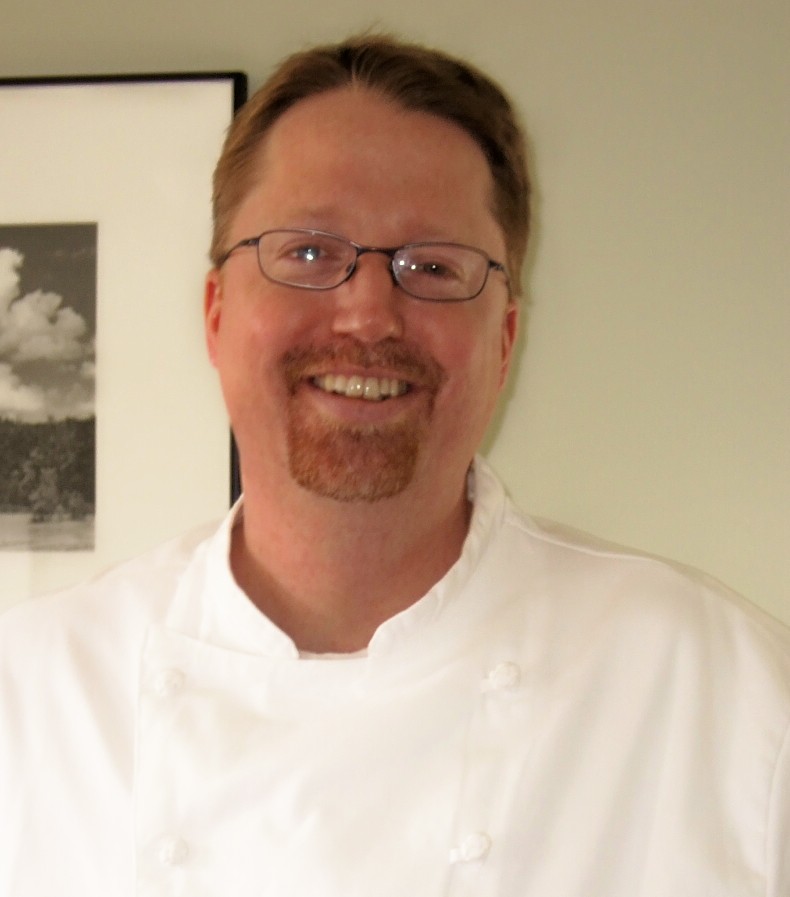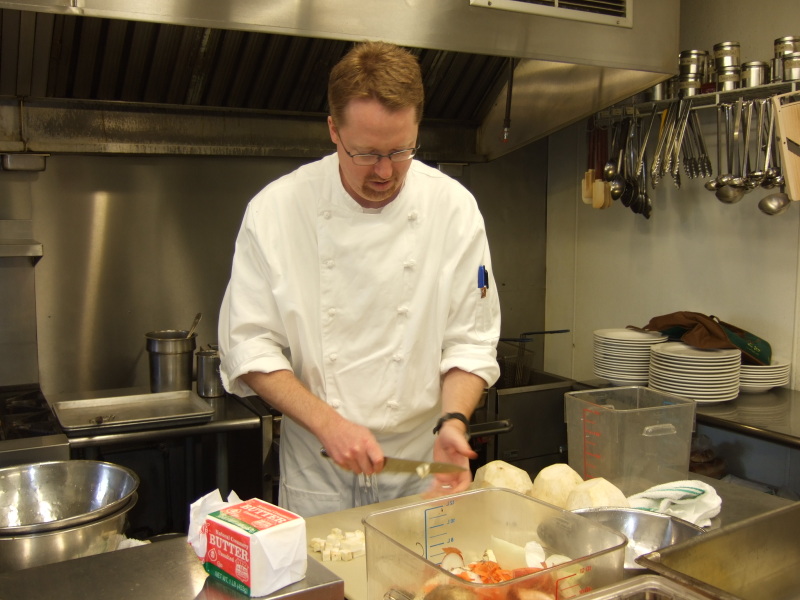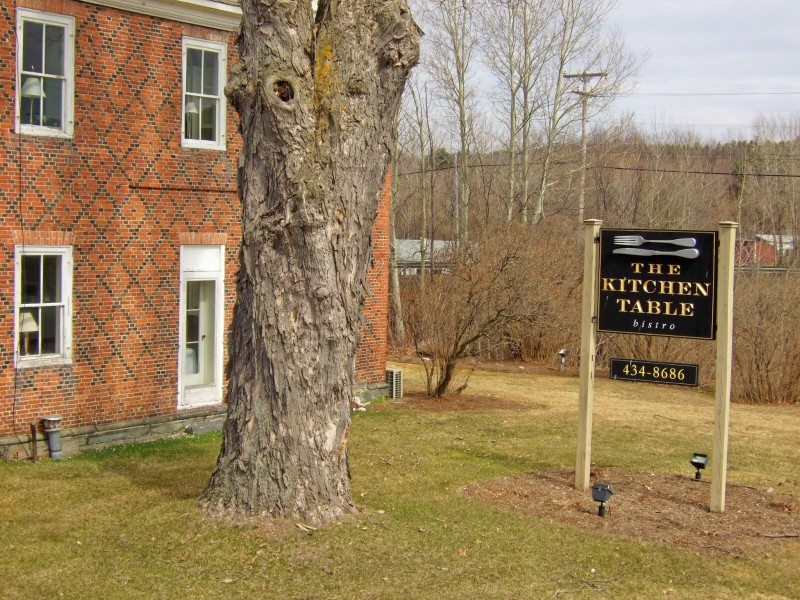Chef Steve Atkins, The Kitchen Table bistro
 Where did you grow up?
Where did you grow up?
I grew up in Shelburne, VT. Having not been born here, I'm really not considered a Vermonter, but certainly my formative years were here. I like to think of myself as a Vermonter more than anything. My wife, Lara, is from Knoxville, TN. We met in culinary school, NECI.
Think back to when you were a kid, what did you want to be when you grew up?
I was pretty set on my path towards being a doctor. It's what I went to school for, it's what I thought I was doing. I took my entrance exams and was well on the way. I had an epiphany the last part of my senior year in college, that I really didn't want to become a doctor. Pretty much everyone of my summer jobs had been in a kitchen in some fashion. Washing dishes to start, a prep cook, even though there wasn't necessarily special at the level I was in the kitchen, I loved it and realized there was a reason I kept gravitating back to kitchens. I always cooked for myself at home, experimenting with whatever was in the spice drawer and whatever my dad pulled out of the garden. I came to the realization that this is was I was and what I really got excited about doing. Here I am, many years later.
You referred to what your dad 'pulled out of the garden?' What kinds of produce, via the garden, were you exposed to as a child?
My dad grew everything. He was a poor farmer's son in Arkansas and farming was just something he did. It was a passion of his, not a profession. It was how he spent all his brief summer hours here in Vermont. Grew everything from okra, to peanuts, tomatoes, corn and all the squashes. Everything. Even though we were a family of devout carnivores, we had tons of pure vegetarian meals in the summer. Just because it was what we wanted to have. 'Tis the season. You take advantage and revel in what you have right now.
There's nothing like a freshly picked pea when you pop it in your mouth.
You can say that about anything you pull from the garden. It's not bred for shelf life or picked early for transport. It's ready to eat, as is.
Would you say that your dad was the influence in your family with respect to food?
Both my parents really. Dad with what he grew and his excitement of the different varieties. It hard not to get excited about it. My mom is a very good cook and loved to experiment. Experiments didn't always turn out successful, but she wasn't afraid to try.
 To me there is no failure, it is a stepping stone to where you want to be. Then there was your dad supplying a plethera of ingredients. Great combination., but going from medicine to food art is a 180 degree shift.
To me there is no failure, it is a stepping stone to where you want to be. Then there was your dad supplying a plethera of ingredients. Great combination., but going from medicine to food art is a 180 degree shift.
It might be more than 180. It's more than just the opposite direction. I had summer jobs that I really liked and kept getting drawn back to kitchens. Food was a major part of my background, but just as it related to my family life and that I liked eating. From my earliest memories, I remember eating lima beans and loving them. Not your average kid food. I still love them. Some of my memories are of, unfortunately, foods I didn't like at the time but love now. They are fantastic and under appreciated. It's a host of reasons that led me to the realization to change careers. I'm glad I came to it before I had gone too far down that other professional path. It's worked out pretty well all in all.
You still have the element of science in cooking which keeps your right brain happy.
It's definitely not the science part of it that I like. It's the creative part. Strange as it might sound it's also the daily stress. There are some days that might be a little more stressful than you prefer, but you stay in the business because you thrive on constant change. You can't make it without loving the constant changes.
It's a different kind of energy level and personal relationships will either bond stronger or disappear. Make it or break it.
Exactly.
Let's talk a little bit about your NECI experience. I know you didn't complete your schooling there.
Lara & I drop outs. (smiles broadly) We both had experience prior to going to school. We both had our college degrees. We didn't go there for a degree, a piece of paper. We went there because we knew what we wanted and where we wanted to be. We didn't necessarily know everything, by any means. We were young enough to think we knew a lot more than we did.
It was a great program and we still think very highly of the school. The school's program wasn't for us, where we were at the time. We weren't getting enough out of the school at that point. Enough beyond what we already had in terms of experience. We didn't want to spend more money going into debt for school. We preferred to spend more money actually going out to eat and working for no money. Doing it in a great place and a great food city (San Francisco/Napa). Getting more of the real life hands on experiences.
When you came out of school are you ready? Many chefs tell us you get all of the mechanics but you're not ready. Between the front of the house and the back of the house, it can be overwhelming. In medicine, your internship is lengthy in comparison to the intership for a chef.
It takes years to get enough experience to progress. I mean just to get that base of knowledge, it takes far more than school will ever give you. Far more than a 6 months internship will give you. It really is a years and years process.
The world of food continues to change daily, almost from moment to moment, depending on where your focus is. The concept for The Kitchen Table bistro is local ingredients, farm-to-table. Are you trying to incorporate the 10 mile rule?
In a lot of ways we are fortunate that there are so many things within 10 miles. For us it's about relationships. Wanting to know who we're getting it from, especially in season. The farmers are delivering to the back door or we're driving down the road to the farmstand. It's the interaction and the relationships. They'll tell us when this (some veggie) is done, but this will be ready. We change our menu quite often anyway, but it's a pretty action packed growing season here, even though it's short.
It's a very concentrated season, with so many items available at the same time.
Exactly. If it's available here, we want it on the menu. If we have to change the menu every 3 days to get the next thing on , even though tomatoes just came in, then we do it. It's on as many things as we can get it on to take advantage, because by that point Vermonters are ready for something else.
Mazza's bi-color corn and silver queen is very sweet. I remember picking up freshly picked ears and going straight home and in the pot. Nothing like it. Do you get tomatoes from them?
 We get our tomatoes from Half Pint Farm. They have all heirloom varieties and they treat them like they are their babies. They carefully and lovingly lay them down and they are in pristine condition.
We get our tomatoes from Half Pint Farm. They have all heirloom varieties and they treat them like they are their babies. They carefully and lovingly lay them down and they are in pristine condition.
Mazza's is more commercial and has been around for a long, long time. When you say produce in this part of Vermont they are a name that comes to mind.
They are a staple here. Certainly in terms of their size and efficiency. They are setup like a big farm and produce a ton of stuff. Not everyone can provide everything. We have our sources for our different favorite things.
Your philosophy is to support numerous farmers from around the area. Speaking of produce availability, what do you do in the winter? Winters are very long in Vermont and obviously you can't get fresh picked lettuce.
A lot of the farmers either extend their season with coop houses or greenhouses of some sort. We get grains a lot earlier in the year and get the ball rolling or get things later in the season. There are some who grow for storage so they have something to sell during the winter.
Mostly root vegetables.
Yes and we've started preserving and freezing a lot ourselves here. By doing that we are trying to extend the season.
My first years here I decided to do what Lara is doing. Pick some berries and freeze them for winter consumption. I picked between 3 to 400 pounds of various berries. We had to buy another freezer, I hadn't realized what I had gotten into until 700 jars of jams later!
All starting from a berry.
Do you cook fiddleheads?
We do absolutely
What do you do with them?
Whatever way we can, in a fritto misto salad. When it shows up people are ready for the first green thing. We put in as many things as we can manage. Usually when we get them, we literally get them by the bucketful.
They are such an interesting plant. In the budded form consumption is okay, fully open can be deadly. Fascinates me.
Wonder who was the first one to discover that? (Laughing)
In all honesty, I've never eaten one. They were never what I would call eye appealing.
Describe what a fiddlehead tastes like for those who've never had one.
It's like a really concentrated spinach, sort of. It wound up tightly, like 40 spinach leaves into this little fiddlehead. It's a fresh little taste of spring.
As I was driving here I'm look at what I know to be lush green mountains in spring and summer. Right now they are very drab and dreary. I understand why people would excited about that 'little taste of spring.' What's the most important thing for you in running your kitchen?
It depends on which part of the kitchen you are asking about. It's dedication and consistancy; to the restaurant of course, to the food, to the staff and to ourselves. We spend a lot of time here together. It's not easy work by any means. You need to be here for the right reasons. You can't let yourself get soft or lax about how you do it. There's a reason why you're in business and why people come back year after year. Yyou have standards and you care about what you do and why you do it.
The consistancy in doing it that way, day in and day out. No matter how tired you are, or stressful it is, you can't let the other factors affect it. You have to be the same person, the same cook and the same chef every day. Whether you're the dishwasher or the bus boy, it's your job. Those who move up in the food industry do it well all the time. Do the job the way you would want someone to do it. That's how we try to do everything here.
It represents who you are.
Yes, exactly.
What's the most challenging thing about working with another chef who happens to also be your wife? Is your wife still doing the front of the house and you the back?
(He smiles.) Not any more, she does private party planning and all those details, and she is the pastry chef. For us, the hardest part is that she's here during the day, I'm here at night. We see each other a little bit in the crossover, but I'm not home with the family at night as often as I would like to be. But, this is what we do and obviously being in the business she understands. The first couple of years we lived in the apartment upstairs so when our child was young I saw him all the time. That's how we ended up in a building like this with apartments so that our child was never in daycare. He was pretty much always with one of us. That's how we wanted it to be.
Same thing, you choose to do a restaurant for one reason, we choose to have a baby because we wanted him as part of our life. We wanted to be a part of his life and it can be hard to balance that with a restaurant. We're closed 2 days a week and major holidays. The major holidays we are open, we close for a day or two after.
We spent too many years working for people who weren't chef/owners and weren't an active part of the restaurant, where we worked holidays. It's not really fun to work on Christmas and the family is at home.
 Independent restaurants have articulated the same sentiments to us. They are more attentive, in most cases, to their staff. Not being open on Christmas Day for example.
Independent restaurants have articulated the same sentiments to us. They are more attentive, in most cases, to their staff. Not being open on Christmas Day for example.
You can lose a lot of business not being open on that day. It is a big decision.
Do you have a favorite item on the menu right now?
It may sound evasive but it's my menu and I love it all.
How about from a creative perspective?
My wife and I were just looking through a food magazine. It's a new format and part of it is that the contributors have this little blurb about who they are. It's a little question and answer thing, you know, "What's your favorite food? What are you obsessed about?...."
I don't have any least favorite foods. All of my foods are favorite foods and I get truly excited about whatever it is I'm doing. One person said brussel sprouts. How can they say that? Everything is good.
I agree with that. I feel that the person just hasn't had them prepared correctly.
I'm not trying to evade the question, I just love it all. I love food, it doesn't matter what it is. I love food for being what it is. I love burgers not any more or less than I love steak, or rack of lamb. It doesn't matter what the ingredient is, if it's what it should be, I love it.
You are a foodie.
(Broad grin) Oh yeah, that's why I do this. It is our profession and our hobby.
Is it a 24/7 thing for you? It is for me. Read about it, shop for it, create with it, consume it.
Absolutely. You think about, it's always on your conscience.
This is the typical trend question. Is there a trend you wish would disappear?
Not necessarily, a lot of the trends in general, I tend to shy away from. I'm not a trendy person. Vermont I don't see as a trendy sort of place. Molecular gastronomy, or whatever they're talking about, it's not for me. I think it's amazing what they can do and how they do it. That's not to say that parts of it can have a place in any kind of restaurant. It's not a style that I will cook. It's not what appeals to me about cooking, I'm more about food in general. What the right chef can do with the right ingredients and the right technique, it really is amazing.
It is amazing. Jose Andres' liquid olives, mozzarella spheres and foie gras cotton candy grabbed my attention and many others.
It sounds crazy yet amazing. We're a little bistro in Vermont.
That type of presentation is not conducive to the clientelle here. Your approach is simple.
We just want to make good food and have people feel comfortable and entice people to try things about which they would normally say "I don't like (reference to brussel sprouts) those." Come in and have it done well, fresh from our local farmer and we'll change your mind.
You'll change their palate too! You and Lara develop a menu together, share that process with us. You handle the meat and potatoes of the menu and she handles what I call the Sweet Beat side. Do you cross over?
We certainly share ideas constantly. In part because it's what we have always done together. It's our hobby at home. With our son, fortunately he loves it as well.
You're priming him.
(Smiling) He does pretty well with the food deparment. We talk about the menu constantly. Whether it's specifically about our menu or just food in general or a dish that would really be great. Constant ongoing conversation.
Those of us who true foodies get inspiration from various food publications. Do you?
Right now all the publications and books are about spring, things that we are still dreaming of. (Laughter) You see it and you getted excited for what's coming up next. You start thinking, we'll do this and we did that last year, this year I want to do it with this. More fuel for the conversations.
You go back and review what you've done.
Never, it's just based on memories of what we've made. We have all the files of course, but we have some standards that kind of reappear. Mostly it's just variations on the theme. When it's asparagus season, we get it on whatever we can. You just work it in whatever way strikes your fancy.
When the 'season' is over you have to revamp your menu. Michel explained that to us when an unexpected frost hits, you may no longer have the heirloom tomatoes you thought you would for that week. The average diner doesn't grasp that.
Around here they do. It's hard not to be pretty tied to the seasons here. Things like the Vermont Fresh Network movement and it is a farm state and things do grow in the ground.
And when it snows, you can't get it!
(He smiles.) People are pretty understanding and again, just as they revel in the season when it's here, they're sad when it's gone but they're excited about the next season.
Majority of your patrons locals?
 It's a pretty good mix, but mostly local. Local is a pretty big area. We are centrally and conveniently located. It's easy for people to get here from just about anywhere.
It's a pretty good mix, but mostly local. Local is a pretty big area. We are centrally and conveniently located. It's easy for people to get here from just about anywhere.
Great piece of real estate, I feel like I've walked into your house.
That was kind of our mission when we opened it. We wanted it to be like you are coming into our house. We lived upstairs, so literally it was our house in the beginning. (We both laugh)
We want people to come in and feel comfortable, have a good meal, drink great wine and have a great dining experience. To feel like they are leaving a good friend's house and want to come back soon.
Most embarrassing thing that's ever happened to you in a kitchen?
The worst was my first day dish washing, I accidently set off the fire suppression system. (He blushes) It was a pretty bad first day. I was shown to do something in not a very smart way and obviously it led to bad things. I stayed on there for a couple of years and moved up, front of house assistant manager and back of house lead line cook.
Lots of hands on experience there and got a little wet too. (We both laugh) Our chef's favorite book is On Food and Cooking, do you have a reference book you use regularly?
It depends on the mood, what I'm thinking about or what I've just eaten. There are a lot of factors. There are some books, they are usually restaurant books or chef/restauranteur books. For awhile it was the Charlie Trotter books, they are all beautiful and beyond what we want to do here. The approach and pristine quality of everything, you can't find any fault with it. Probably my two favorites to look through are the Boulevard, The Cook Book (Nancy Oakes) from San Francisco and Frank Stitt's book Highlands Bar and Grill (Birmingham). My dad's from Arkansas and my wife's from Tennessee, I love southern food, even more than any other part of the country. Even though every area has their local dishes, ingredients or approaches; southern cuisine is by far the most defined American cuisine. The dishes, the ingredients that you don't see anywhere else. You can't find okra in any old market up here. You really have to search it out.
Part of that is due to the growing season. It's not long enough for some of those souther specialties. When I left Vermont, there were a lot of farmers that were moving beyond crops typically associated with the agriculture here. Advances in technology, greenhouses, etc. Having the ability to extend the growing season, allows farmers to consider growing crops like okra.
My dad was growing okra 25 years ago. Not because it was any special northern breed or anything. He couldn't find any so he grew some. There are a lot of Vermonters who might not know what to do with it, or might not like okra because it's kind of slimy. You're not going to find etouffe or she crab soup up here because it doesn't exist. It's not a dish up here.
Is it safe to say it's (okra) like a chocolate covered ant for them.
(He is laughing at me!) Maybe in an interesting sort of analogy, yeah.
Some of the produce that comes out of the south is unusual in appearance. There are some nice grocery stores, especially in the Burlington area, that carry the more unique fruits and vegetables. It's interesting to watch people look at them when they shop. They either scowl or just glance because they don't know what to do with them (starfruit, ugly fruit, etc.) Adding something like okra to one of your entrees for them to try is a wonderful way to introduce it.
Professionally, who has been the biggest influence?
Loretta Keller. She was my chef in San Francisco. She has an amazing sensibility about food. I love her approach and how she ran her kitchen and her business. Definitely inspiration for both of us. for what we do, why we do it and how we do it. She's a good person. She cooks because she loves food and obviously likes the restaurant business as well. It's just how she approached what she did. We loved it and we still talk about our time there. Very young fledgling cooks living in San Francisco, it wasn't very hard to live beyond our means. Trying to take advantage of all the restaurants and the markets.
A first time visit to San Francisco can be overwhelming, there is so much to choose from. I understand that you also worked in Napa.
We were in Napa for quite awhile. San Francisco was great. It was amazing for us but we're not really city folk. Napa is the same food experience in a glorious farm setting. It's farm country, real expensive farm country.
As I was driving through Bolton Flats coming here I was thinking that you left the rolling green hills of Vermont, go to the west coast and the setting is similar. Even though you were on the west coast you still had some connection with Vermont.
Absolutely. It was because it was farm country. It's hard to compare it directly, but farm country and Bolton Flats have the same connection to the land. The connection with space and time that fuels what we do here. What we found here is the same feeling there.
The pace is different in Napa than in San Francisco. There's a buzz about artisanal salts, with black garlic quickly catching up. Do you use anything like that?
No. Like I sorted hinted at before, me and trendy are not so tight. I tend to resist, even if I end up liking it in the long run. When it comes on the scene as a trend, whether it's in the restaurant, like Crocs. You can't go anywhere without people buying Crocs. They're really comfortable and I like them a lot now. It's the notion that I don't like trendy, just because it's trendy.
Everyone knows that knives are a chef's most important tool. Do you have another tool that you 'can't' live without.
We don't have a lot of gadgets, but for me one of the most important things, it's a silly little thing, is the rasp. As opposed to an old lemon zester.
I'm just beginning the journey to explore salts. I'm like the person whose never tried the okra.
When one of the cooks here asks me about this or that I think back 100 or 200 years ago when French cuisine is developing. Cooks were doing some amazing things and they didn't have the benefit of any of the new fangled tools, gadgets and things some chefs think they can't live without. They didn't have 14 different types of salt. to me it seems a way to pat yourself on the back on something new and special that you discovered. That you simply have to share with everyone. That's not who we are.
It was either you or your wife who was quoted as saying you were not into "those towers of leaning nonsense."
He's laughing. We're very practical and have a Vermont approach about things. Things are already beautiful because of what they are, not because of what you've done to them.
Let's talk about the James Beard experience. Congratulations, what an incredible honor.
It's definitely an honor and a thrilling surprise. Here we are in small town Vermont. It's hard to think of ourselves on the same scale as all these other chefs that we've read about and have seen in the major press for years and years. It's hard to see ourselves in that same light. It's definitely an honor to be associated with them. Just having our name on a website with James Beard's name on it, is pretty exciting.
Did they call you?
No, Eric (Chef from Hen of the Wood - Waterbury, VT) saw it on their website and called us. Pure surprise.
Even though it takes about 5 hours from NYC, 3 from Montreal or Boston, people will come and they will want to see what you are all about. Concierges will be recommending your restaurant! It used to be that NYC foodies would travel the tri-state area (NY, NJ, CT) to dine, now they will venture this far north and make a weekend out of it. You get to have the all natural, pristine lifestyle that you want and stay true to your local concept. Then a high profile foodie comes in and tells the world, "Hey, you need to pay attention to what Steve and Lara Atkins are doing in Richmond, VT. It'll blow your socks off."
In a very understated Vermont way.


